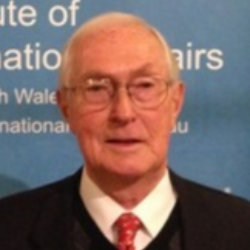GEOFF MILLER. One dance too many - a new quadrilateral defence grouping.
May 25, 2017
Recently Paul Keating, in launching Allan Gyngells book on Australian foreign policy, said that smart countries did not tie themselves too closely to fixed positions in foreign policy—rather, they danced around. He said this in the course of arguing that Australia should not be so overawed by its alliance with the United States that it felt it had to join in every US policy initiative; some havent been successful, he said, and we should decide on what we did based on our own interests and consideration.
This seems very sound advice, from an experienced participant in international affairs. However some recent reporting seems to indicate that we may be taking it to extremes. I refer to a report in the Financial Review of 21 April, which said that in meetings to take place in Tokyo shortly thereafter, the possible re-formation of a quadrilateral grouping of the US, Japan, Australia and India would be raised. The meetings were to involve our Defence and Foreign Ministers, presumably with their Japanese counterparts.
Defence Minister Marise Payne was reported as saying that Australia is very interested in a quadrilateral engagement with India, Japan and the United States, what form that may take is a matter of discussion between our various countries.
The US, Japan and India are of course all countries with which Australia has friendly relations, which it hopes will develop further. But there is an unspoken aspect to this proposal, and some recent history. It was first initiated by Japanese Prime Minister Abe, during his first term as leader of his country, and was at the time supported by Prime Minister Howard. However it was roundly criticised by China, which saw it as proof of Western designs to contain it, and the Rudd Labor Government took an early opportunity to withdraw Australia from it.
It appears that Japan is behind its current re-surfacing. That is not surprising, since Japan is fundamentally concerned about Chinas rise and the related diminution in its own international role, and seeks to counter this by stressing its points of similarity or convergence with other free market parliamentary democracies.
But the problem with emphasising these similarities is that it treats China as an other. That is what Japan intends to be the outcome, but it is not in accord with long-established and bipartisan Australian policy, which is to promote Chinas emergence as a constructive international actor, and also to promote our own relations with it.
Indeed the importance and centrality of Chinas role, particularly in Asia, could hardly be emphasised more than it is at present, with our own government, like that of the United States, turning to it as the best hope of bringing stability to a North-East Asia threatened by the North Korean regimes hostility and instability as exemplified in its nuclear and missile programs.
In bilateral terms our relations with China are strong, both economically, of course, and in terms of contact at the highest levels of government, with recent visits to Australia by the Chinese Prime Minister and Foreign Minister.
So, at a time when even President Trump, despite his pre-election rhetoric, is seeking to constructively engage China and stressing his positive relationship with President Xi, the last thing we should be doing is constructing an ideological grouping—really a dividing line—in Asia, something which China would certainly see as a way to contain its rise, as former Ambassador to China Geoff Raby has said.
It’s always sad to see energy wasted on bad ideas. Its really quite alarming to think of the energy, ingenuity and effort which the British Government is about to spend on its thoroughly retrograde policy of taking Britain out of Europe, and thus damaging one of the great projects of the post-World War II era.
Positive engagement with China, and promoting its positive engagement in the region and internationally, has been one of the major bi-partisan Australian foreign policy positions ever since the time of Whitlam and Fraser. Not all Chinas actions make this easy; but we should not risk it by promoting an idea whose time has come, and gone, and which would at a most inopportune time re-kindle in Chinese minds the bogey of Western containment.
Geoff Miller was Director General of the Office of National Assessments, and Deputy Secretary DFAT. He was also Australian Ambassador to ROK, Japan and High Commissioner to New Zealand.
